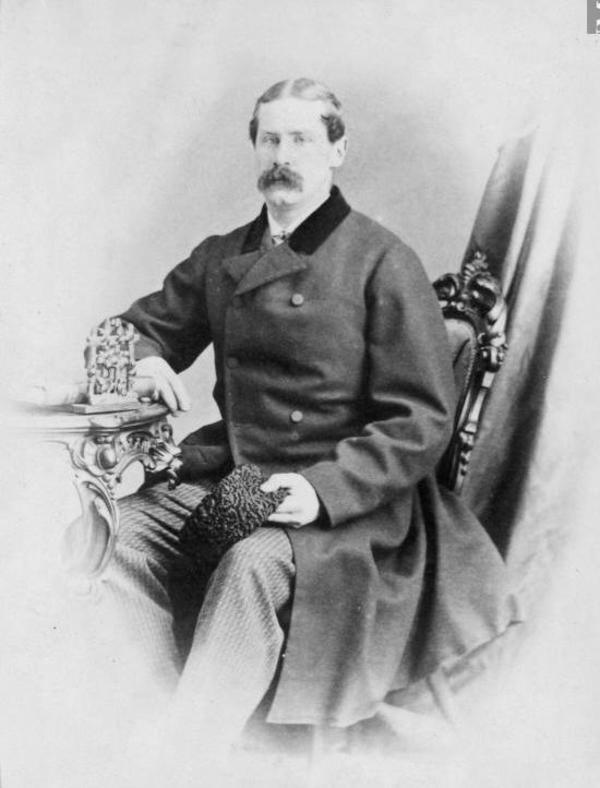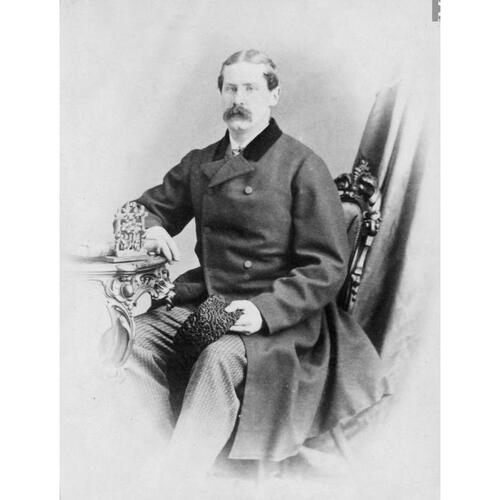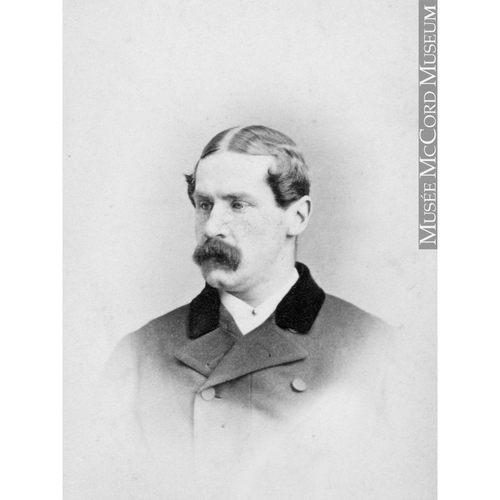
Source: Courtesy of Wikimedia Commons
DELISLE (DeLisle), ALEXANDRE-MAURICE, public servant, member of the assembly, and businessman; baptized 21 April 1810 at Montreal, L.C., third son of Jean-Baptiste Delisle, a public servant, and Mary Robinson; d. 13 Feb. 1880 at Montreal, Que.
After studying at Montreal, Alexandre-Maurice Delisle was admitted to the bar in 1832, and on 29 April the following year he married Marie-Angélique Cuvillier, daughter of Augustin Cuvillier*, member of the assembly, merchant, and well-known financier. In 1833 also Delisle had begun his cursus honorum in the public service at Montreal. First a clerk of the peace (8 Jan. 1833), then clerk of the crown (February 1833), he was nominated as commissioner (April 1838) to receive the oath of members of the Special Council. Shortly afterwards he again became clerk of the peace (25 May 1838), and then, on 13 April 1843, clerk of the crown. He was appointed harbour commissioner on 27 May 1859, and also accepted the post of sheriff in March 1862. It was in this last capacity that he presided over the reorganization of the Montreal prison; but it was during this year that he suffered the worst setback in his career.
In February 1863 he was publicly accused, by his brother Michel-Charles, of having perpetrated sizeable frauds when he was clerk of the crown. The investigators, Pierre-Richard Lafrenaye and Marcus Doherty, appointed by the ministry of John Sandfield Macdonald and Louis-Victor Sicotte*, concluded that Delisle, his fellow clerk William-Henry Bréhaut, and their deputy Charles Schiller, had obtained considerable sums by means of false returns and overcharges on the cost of subpoenas, which had permitted them to carry through some attractive speculations. On 19 Dec. 1863 Delisle was therefore relieved of his duties as sheriff, and in January 1864 of his post at the harbour commission. The inquiry had produced lively excitement in Montreal, and as it was directed by Delisle’s political enemies, it brought him the warmest sympathy from Conservatives. The procession of witnesses who had come forward to support him comprised almost the entire élite of the party: Henry Hague Judah, Charles-Elzéar Mondelet, William Badgley*, Lewis Thomas Drummond*, Charles-Joseph Coursol*, Louis-Siméon Morin, William Workman, Jean-Louis Beaudry*, Thomas Cushing Aylwin, and Sir Louis-Hippolyte La Fontaine*. Delisle claimed that the whole inquiry was a plot organized by Joseph Doutre*, a rabid Liberal. In any case, after the Conservatives had regained power, he was reinstated on the harbour commission (22 Aug. 1866), and later became its president. On 20 Aug. 1866 he had already accepted the post of collector of customs at Montreal, an office he held until 1874, the year of another Liberal victory. He then resigned; at the same time the ministry of Alexander Mackenzie* requested him to relinquish his presidency of the harbour commission.
Clearly the vicissitudes of Delisle’s career in public administration had a direct relation to the role he played in political circles. Even before the birth of the Bleus he behaved like a Conservative. In 1841, yielding to the request made by Lord Sydenham [Thomson*], he had stood against James Leslie in Montreal County. The better to ensure his victory, and the more readily to command the electors’ respect, he had had himself appointed a police magistrate a few days before. It was an unnecessary precaution, for after a, few scenes of violence in the course of which two of his Irish supporters were killed, a riot broke out and Delisle was proclaimed elected. At Kingston he regularly gave his support to the governor’s party, and on 23 June 1841, when John Neilson* made his famous motion condemning the Union, he was one of the two French Canadians who refused to support him. In July 1843 he resigned when he became clerk of the crown. He never returned to active politics, but none the less continued to show himself a person of strong views.
In March 1844 Delisle was a returning officer for a Montreal by-election, a violent election during which Lewis Thomas Drummond won against William Molson, the candidate of the governor Charles Theophilus Metcalfe*, to whom Delisle had given his unqualified support. After that, and until his death, he was one of the most prominent figures in the Bleus. He subscribed regularly to the party treasury, and in the counties where he owned property he exercised an influence on the electors that was often decisive. For example, in Argenteuil County in 1854 he paid out several thousands of dollars to get his friend Sydney Robert Bellingham* elected. Furthermore, he always kept the close and devoted friendship of George-Étienne Cartier, who is said to have set great store by his judgement and his discerning and practical advice. At the time of his death, rumour had it that he would soon have been appointed a senator.
It was particularly as an entrepreneur and a businessman that Delisle made his mark – and his fortune. According to an obituary in La Minerve of 16 Feb. 1880, “he was the practical man par excellence, always ready to meet and solve a difficulty, always equal to a situation. . . . He was therefore always able to achieve his aim, through his enlightened will and the inexhaustible resources of a subtle, sharp, and shrewd mind.” For example, he made several successful speculations in land in the Rimouski and Pointe-au-Père areas, and notably, in 1864, in partnership with William Workman, he bought an expanse of 78 acres which in a few years became the flourishing town of Sainte-Cunégonde (later annexed to Montreal). He was appointed in 1850 one of the directors, and later the president, of the Montreal City and District Savings Bank. He was likewise a director of the City Bank. During the 1840s, working with Wilfrid-Antoine Masson, Henry Hague Judah, and 35 other associates, of whom 22 were French Canadians, he became one of the most enthusiastic promoters of the Montreal and Bytown Railway, to which he subscribed £1,000. This company, of which he was president in 1854, went bankrupt in 1859, but not before the completion of the portion of line from Carillon to Grenville, which particularly concerned Delisle and his partner Bellingham. He was also a director, then president, of the Champlain and St Lawrence Railway Company, until it was combined with the Grand Trunk in 1872. In 1857 he joined with 32 of the principal capitalists of Montreal to place at the disposal of this company, and of the Montreal and New York Railway Company, a sum amounting to £40,000. At his death he was still a director of the Gulf of St Lawrence Steamship Company, and it was to extend the operations of this undertaking that he had visited the West Indies during the summer of 1878. In 1865 he had, moreover, been a member of the commission responsible for establishing commercial relations with Latin America, and in 1866 he had gone to the West Indies for the first time, before visiting Mexico, Brazil, and several other countries of South America. He also owned bridges over the Rivière des Prairies and several toll-roads on Île Jésus.
Delisle’s will, of which the last codicil is dated 24 Jan. 1880, gives an idea of the extent of his fortune. After bequeathing $2,000 to a priest of Saint-Sulpice for charitable works, and some $300 to religious foundations, he gave instructions that following the death of his wife his assets should be divided in equal parts among his children, and that the sum of £70,000 should be deducted from the portion allotted to his two sons, Maurice-Nolan and Charles-Alexandre; they had had interests in the iron trade and in their collapse (before 1862) their father had lost this sum.
Influential, well-to-do, and always very much in evidence because of his social connections, Alexandre-Maurice Delisle was naturally called upon to assume many honorary positions. On 11 Dec. 1837 he was elected churchwarden of the parish council of Notre-Dame, and in 1841 he was credited with having induced Lord Sydenham – a remarkable feat at the time – to be present at the sermons of Bishop Charles-Auguste-Marie-Joseph de Forbin-Janson*. On 21 Oct. 1854 he was appointed a member of the provincial committee responsible for seeing that the industry and resources of the province were properly represented at the universal exposition in Paris. Finally, in 1860, the city council of Montreal appointed him president of the committee entrusted with arranging the decorations and preparing for the reception of the Prince of Wales in the capital. Such positions, which brought him consideration and respect, no doubt compensated for the insults, political persecutions, and denunciations to which he was exposed. These passions, current at that time in the worlds of politics and business, never succeeded in bringing him down.
Delisle was a man of sturdy build and tall stature; he had keen eyes that sparkled with intelligence; a staunch defender of his nationality, he knew himself to be respected by his friends, and, because of his resources and successes, to be above the common level. He was one of the most remarkable French Canadians of the second third of the 19th century, both because of the social position that his spirit of enterprise and great political activity earned for him and because of the fortune he was able to acquire. He lies at the top end of the cemetery at Côte-des-Neiges, beside Louis-Adélard Sénécal* and Sir George-Étienne Cartier.
A.-M. Delisle, General rules and regulations for the interior order and police of the common gaol of the district of Montreal ([Montreal?], 1864).
PAC, MG 24, B103 (Delisle papers); MG 30, D62 (Audet papers), 10, p.286–88. Archives de l’université de Montréal, Collection Baby, 108, 114. BNQ, Société historique de Montréal, Collection La Fontaine, Lettres, 237, 276, 652, 656, 660, 663, 665, 666, 667, 669, 670, 678, 682, 685, 686, 689. Correspondance, documents, témoignages et procédés dans l’enquête de Messrs Lafrenaye et Doherty, commissaires, dans le bureau du greffier de la couronne et greffier de la paix, Montréal, suivis des remargues de Messrs Delisle et Schiller sur cette partie du rapport des commissaires qui a pu être connue et les remarques de Mr. Bréhaut sur la lettre annonçant les causes de sa démission (Montréal, 1864). Railroad between Quebec, Montreal, Bytown and Georgian Bay; great public demonstration; presentation by A.-M. Delisle of the petition of the citizens of Montreal to the common council of Montreal, praying for aid to said railroad . . . (Montreal, 1853). La Minerve (Montréal), 1864, 16 févr. 1880. Montreal Gazette, Dec. 1863. Dom. ann. reg., 1880–81, 405. Cornell, Alignment of political groups. Monet, Last cannon shot. T. T. Smyth, The first hundred years; history of the Montreal City and District Savings Bank 1846–1946 (n.p., n.d.). G. R Stevens, Canadian National Railways (2v., Toronto, 1960), I, 39–43. F.-J. Audet, “1842,” Cahiers des Dix, VII (1942), 216–18. É.-Z. Massicotte, “La famille de Jean De Lisle de La Cailleterie,” BRH, XXV (1919), 175–86. Jacques Monet, “La crise Metcalfe and the Montreal election, 1843–1844,” CHR, XLIV (1963), 1–19.
Cite This Article
Jacques Monet, “DELISLE (DeLisle), ALEXANDRE-MAURICE,” in Dictionary of Canadian Biography, vol. 10, University of Toronto/Université Laval, 2003–, accessed December 31, 2025, https://www.biographi.ca/en/bio/delisle_alexandre_maurice_10E.html.
The citation above shows the format for footnotes and endnotes according to the Chicago manual of style (16th edition). Information to be used in other citation formats:
| Permalink: | https://www.biographi.ca/en/bio/delisle_alexandre_maurice_10E.html |
| Author of Article: | Jacques Monet |
| Title of Article: | DELISLE (DeLisle), ALEXANDRE-MAURICE |
| Publication Name: | Dictionary of Canadian Biography, vol. 10 |
| Publisher: | University of Toronto/Université Laval |
| Year of publication: | 1972 |
| Year of revision: | 1972 |
| Access Date: | December 31, 2025 |




